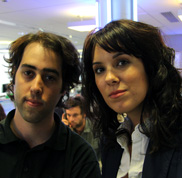When Israel is forced either to have its cake or eat it
In his speech before the United Nations General Assembly on Friday, presenting the Palestinians' bid for statehood, Palestinian President Mahmoud Abbas evoked his people's past attempts to gain international recognition. Chief among those was Yasser Arafat's appearance on the same podium, 37 years earlier, as the Palestinians were accorded an observer status. Arafat's 1974 speech, according to Abbas, symbolised the Palestinians' "affirmative pursuit of peace". His predecessor, said Abbas, "urged the United Nations to realise the inalienable national rights of the Palestinian people, stating: 'Do not let the olive branch fall from my hand.'"
Arafat's address, in fact, was not as unequivocal as his long-time brother in arms and eventual successor described it. His concluding remarks were, in full, the following: "Today I have come bearing an olive branch and freedom fighter's gun. Do not let the olive branch fall from my hand. I repeat: do not let the olive branch fall from my hand." This Mafioso-like plea was widely, and rightly, condemned as insincere. Calling it an “affirmative pursuit of peace” is tantamount to taking Don Corleone’s “pretty face” routine as a heartwarming compliment.
The first appearance of the founding leader of the Palestine Liberation Organisation in the limelight of international diplomacy gave piercing insights into the man's political style. For decades to come, Arafat’s leadership of the PLO, and by extension the Palestinian struggle as a whole, were constantly tainted by his oscillation between peaceful overtures and violence, in the spirit of his landmark speech before the General Assembly. Even when he recognised Israel and embarked on a bilateral diplomatic process with his hitherto sworn enemy, many questioned how tight his grip of the olive branch had become. The harrowing memories of the bloody terror campaigns he had carried out and commanded were still fresh.
Arafat himself, too, did little to shed the etiquette of a fiery and uncompromising freedom fighter. When Islamic opposition groups, such as Hamas and the Islamic Jihad, launched terror attacks against Israel during the peace process of the 1990s and to a greater extent after its breakdown in 2000, Arafat issued half-hearted condemnations and repeated his commitment to the somewhat enigmatic "peace of the brave." His direct link to terror was never proved beyond doubt, but his half-truths, subterfuges and double-dealings alienated the already unsympathetic Bush Administration and prompted it to ditch any attempt at non-partisan brokering and unreservedly endorse the Israeli government, then led by Ariel Sharon. This process reached heights of absurdity when Bush labelled Sharon, a bulwark of Israeli militarism and expansionism, "a man of peace."
Until his death in 2004, Israelis persuaded themselves that Arafat is the only obstacle to peace and that once he was gone, the Palestinians would give up their armed struggle and make serious attempts to engage in a meaningful and genuine peace process. Alas, to Israel's misfortune, this is exactly what happened. Mahmoud Abbas, who succeeded Arafat as the President of the Palestinian Authority, was the most prominent Palestinian leader to oppose the violent uprising of the early 2000s, also known as the second Intifada, from its very outset (though some would say it wasn't for the right reasons – Abbas claimed that while killing innocent civilians is immoral, the main problem with resorting to violence is that it sways international public opinion away from the Palestinian cause). Since he took office, Abbas has condemned violence time and again, expressed his commitment to negotiate a solution to the Israeli-Palestinian conflict, and dedicated himself, with the help of his trusted Prime Minister Salam Fayyad, to laying the foundations of the future Palestinian state.
Arafat's duplicity traditionally played into Israel's hands: it appeared as a peace-loving country without having to walk the talk. Its rhetorical commitment to the peace process never had to be put to the test because Arafat was continually suspected an untrustworthy interlocutor; the burden of proof therefore rested on him. Since his demise, the tables have turned, and Israel no longer enjoy the benefit of the doubt. Whereas the Palestinians' overtures have been perceived as genuine by the international community, Israel would have to back up its earnest talk with concrete concessions in order to continue to enjoy its international standing. For the first time, it has been forced to choose between fully and truly recognising the Palestinian national enterprise, at the cost of giving up land and taking security risks, and clinging on to the status quo. Netanyahu has opted for the latter. Every Israeli and Palestinian should hope, for the sake of the entire region, that he will escape Arafat's political fate.
But the prospects are not promising. While US President Barack Obama, probably bound by domestic political calculations, has so far refrained from disavowing the Israeli prime minister and sided entirely with his outright opposition to the Palestinian diplomatic manoeuvre in the UN, others have been less discreet. Former US President Bill Clinton, the godfather of the Oslo Accords, said last week that Netanyahu is to blame for the stalemate in the peace process. Also former US Defence Secretary Robert Gates, for his part, has said some time before his retirement last month (albeit not publicly) that Netanyahu is an ungrateful ally: although the US laboured to guarantee Israel's security, Netanyahu refused to move ahead in the peace process with the Palestinians, which the White House sees as a paramount component of America's interests in the Middle East. It is not entirely improbable that these views, though voiced by has-beens, reflect those of Obama and his entourage. The question is how much more he will be willing to take, and then, when Netanyahu's day of reckoning will come.
Gilad Halpern
Paris




0 Comments
Post new comment